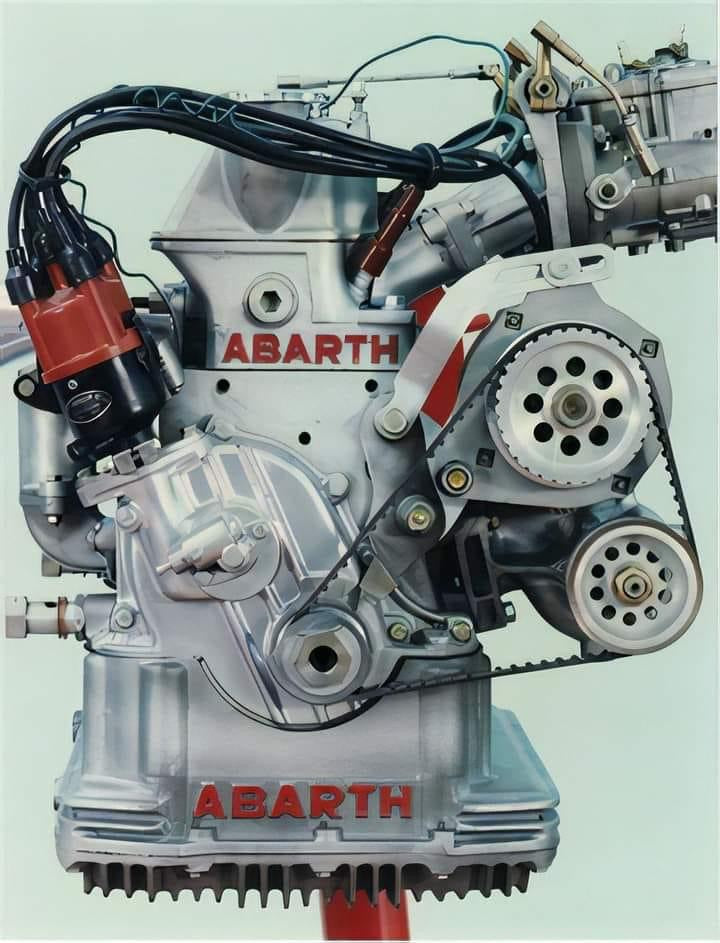
Abarth
History and Evolution of Abarth: From Past to Present
The beginning of an era
The history of the Abarth car company has its roots in the post-war period, when the Turin car factory Cisitalia was just entering the market. It was during this period that Carlo Abarth, a young talent coming from the motorcycle experience with Motor Thun, joined the company, also distinguishing himself as a driver. In 1949, together with his partner Guido Scagliarini, he founded Abarth & C. in Bologna. Their logo, a scorpion, reflected the zodiac sign of both.
The turning point: from racing to processing
Carlo Abarth, a bold and creative entrepreneur, understood that to stand out in the automotive market he had to offer something unique. So, in addition to racing, he began to develop innovative components to improve the performance of cars, such as the famous Abarth mufflers, which not only increased power, but also emitted a distinctive sound. The first Abarth cars, such as the 204, took advantage of these innovations and achieved prestigious victories in racing.
From Fiats to sports cars
In the 1950s, Abarth began collaborating with FIAT, creating special versions of their cars. The Fiat 600 was one of the first to be transformed into a true "Abarth", with the famous Abarth 750. This model, derived from the Fiat 600, won numerous race records and started a long series of successes for the company.
Expansion and sporting success
As the years went by, Abarth grew both commercially and sportily. Victories in motor racing increased the company's reputation, while new locations and collaborations with famous coachbuilders such as Zagato and Pininfarina helped consolidate its status in the automotive world.
The Abarth family: from production cars to racing
In the 1960s, Abarth expanded its range, offering not only race-tuned cars, but also special versions of standard Fiats. Models such as the Abarth 595 and 695 became iconic for their performance and unique style. At the same time, Abarth continued to dominate the races, developing increasingly powerful and innovative racing cars.
The "Omologata Turismo" specials
Another important milestone in Abarth's history was the "Omologata Turismo", special versions of the Fiat 850 and 1000 developed by the company. These models, known for their exceptional performance, demonstrated Abarth's ability to combine power and reliability in production vehicles.
The Legacy and the Future
In the years that followed, Abarth continued to innovate in the world of racing and sports cars, creating bold prototypes and prestigious racing cars. Although the company has undergone changes in ownership and direction over the years, its pioneering spirit and passion for performance remain alive today, making Abarth an icon in the global automotive landscape.
FIAT acquires Abarth
The acquisition of Abarth by FIAT in the 1970s marked an important turning point for both brands in the world of motor racing. The transformation of the Abarth plant in Corso Marche into the official headquarters of Fiat Corse further consolidated the commitment of the Turin-based car manufacturer to the sports scene.
The partnership between Fiat and Abarth gave birth to a series of iconic models, such as the Fiat 124 Abarth Rally, a protagonist of the European Rally Championship in the 1970s and homologated in Group 4. Further successes followed with the Fiat 131 Abarth Rally, which won the World Rally Manufacturers' Championship in 1977, 1978 and 1980, and the legendary Lancia Rally 037, winner of the world championship in 1983, demonstrating that Carlo Abarth's legacy continued to shine even under the aegis of Fiat.
The 1980s saw the collaboration between Abarth and Lancia grow, with the birth of highly successful racing cars such as the Lancia LC2 and the Lancia Delta S4, the latter being the protagonist of the tragic event that led to the end of Group B rallying. In the meantime, Fiat continued to develop sports cars for the road market, with models such as the Ritmo Abarth 125TC and the Fiat Uno Abarth Gruppo A.
In the 1990s, with the acquisition of Alfa Romeo, Abarth extended its influence on this brand too, contributing to the development of racing cars such as the Alfa Romeo 155 GTA and the 155 V6 TI.
The return of Abarth in 2007 brought a new lease of life to the brand, with models such as the Abarth 500 and Abarth Grande Punto winning the hearts of sports car enthusiasts. The launch of special versions and limited series kept the brand fresh, while the opening of the Abarth Driving Academy gave enthusiasts the opportunity to hone their sports driving skills.
Today, with the introduction of the Abarth 500e, the brand demonstrates its cutting-edge credentials even in the era of electrification, continuing to combine sporty performance with eye-catching design and innovative technologies. The history of Abarth is a testament to the passion and ongoing commitment to the world of racing and sports cars.
Models of the Past:
- Cisitalia 204A Abarth Corsa (1949-1950)
- Abarth 205 Vignale Berlinetta (1950-1951)
- Abarth 1500 Biposto Bertone (1952)
- Ferrari-Abarth 166 MM/53 (1953)
- Abarth 1100 Sport (Ghia) (1953)
- Alfa Romeo 2000 Abarth (Ghia) (1954)
- Abarth 208a Spider Boano (1954)
- Abarth 209a Boano Coupe (1955)
- Abarth 210a Spider Boano (1955)
- Fiat-Abarth 750 (1955-1969)
- Abarth 207A Boano Spider (1955)
- Fiat-Abarth 700/750/850/1000 GT Zagato (1956-1960)
- Fiat Abarth 750 Record (Bertone) (1956)
- Abarth 215A Coupe (Bertone) (1956)
- Fiat-Abarth 750 Coupe Viotti (1956)
- Fiat Abarth 750 VIGNALE "DROP" (1957)
- Abarth-Alfa Romeo 1100 Monoposto Record Pininfarina (1957)
- Fiat-Abarth 500 (1957-1963)
- Abarth-Alfa Romeo 1000 GT (Bertone) (1958)
- Abarth 500 Record Pininfarina (1958)
- Abarth 850 Coupe Scorpione (German) (1959)
- Abarth-Alfa Romeo 1300 Berlinetta (1959)
- Abarth 1600/2200/2400 (1959-1962)
- Porsche 356B GTL Abarth (1960)
- Abarth 1000 Record Pininfarina (1960)
- Fiat-Abarth 850 TC (1960-1966)
- Fiat-Abarth 700 Spider (1961)
- Abarth 700S Spider Tubular (1961)
- Abarth 700-1000 Spider Tubular (1961)
- Abarth-Simca 1300 Bialbero (1962-1965)
- Fiat Abarth Monomille GT (1963)
- Simca Abarth 2000 (1963-1964)
- Fiat-Abarth 595 (1963-1971)
- Simca Abarth 1150 (1963-1965)
- Fiat-Abarth 695 (1964-1971)
- Fiat-Abarth 1000 Berlina (1964)
- Abarth 1000 Spider (Pininfarina) (1964)
- Fiat Abarth OT 1600 (1964)
- Abarth SE 08 (1964)
- Abarth 1300 OT (1965)
- Abarth 1000 Monoposto Record (1965)
- Abarth 2000 Monoposto Record (1965)
- Abarth OT 1000 Coupe Speciale (Pininfarina) (1965)
- Fiat-Abarth 1000 OT Coupé (1965-1971)
- Fiat Abarth 1000SP (1966)
- Abarth 1600 OT Spyder (1966)
- Abarth 2000 OT (1966)
- Abarth Scorpio 1300 (1967-1971)
- Abarth T140 (1967)
- Abarth 2000 SP (1968)
- Abarth 2000 Cuneo (1968)
- Fiat Abarth 2000 Sport Tipo SE 010 (1968)
- Fiat-Abarth 1300 OT Coupé (1968-1971)
- Abarth 2000 Pininfarina Scorpion (1969)
- Abarth 1600 Coupe (Italdesign) (1969)
- Autobianchi A112 Abarth (1971-1985)
Recent Models:
- Abarth Grande Punto (2007 - 2010)
- Fiat 124 Abarth Rally (1972-1975)
- Fiat Abarth X19 Prototype (1973-1974)
- Abarth Osella PA1 (1973)
- Abarth SE 027 (1974)
- Fiat Abarth SE 030 (1974)
- Fiat Abarth SE 031 (1975)
- Fiat Abarth SE 035 (1979)
- Fiat 131 Abarth Rally (1976-1978)
- Fiat Ritmo 125 TC Abarth (1979-1988)
Current Models:
- Abarth Punto Evo (2012 - 2014)
- Fiat 131 Volumetric Abarth (1981)
- Lancia Rally 037 (1982-1983)
- Fiat Ritmo 130 TC Abarth (1983-1988)
- Abarth 500 (2008 - 2015)
- Stola Abarth Monotipo 98 (1998)
- EID Abarth scorpION (2011)
- Abarth 1000 SP (2021)
- Abarth 124 Spider (2016 - 2019)
Other Single-seaters:
- Abarth SE 025 (1972-1979)
- Abarth SE 033 (1980-1986)
- TATUUS FA010 (2010-2013)
- TATUUS F4-T014 (2014)
Out of Production Models:
- Fiat Stilo Abarth (2001-2010)
- Abarth Grande Punto (2007-2010)
- Abarth 500 (2008-2015)
- Abarth Punto Evo (2012-2014)
- Abarth 124 Spider (2016-2019)
Special Series:
- Abarth 595 (2017)
- 500 Opening Edition - 200 copies (2008)
- Zerocento - 100 copies (2009)
- 695 Tributo Ferrari - 1696 units (2010)
- 500 Cabrio Italia - 150 units (2011)
- Grande Punto Scorpio - 199 units (2011)
- 695 Maserati Edition - 480 units (2012)
- 595 50th Anniversary - 390 units (2013)
- 124 Spider 2016 Edition - 2500 units (2016)
- 695 XSR Yamaha Edition - 1390 examples (2017)
- 695 Rivale 175 Anniversary - 350 units (2017)
- 695 70 Anniversary - 1949 units (2019)
- 595 Scorpioneoro - 2000 pieces (2020)
Production Models (2021):
- Abarth 695 70th Anniversary
- Abarth 595, 595 165 HP, 595 Turismo, 595 Competizione, 595 Essesse, 595 Scorpioneoro, 595 Monster Energy Yamaha
